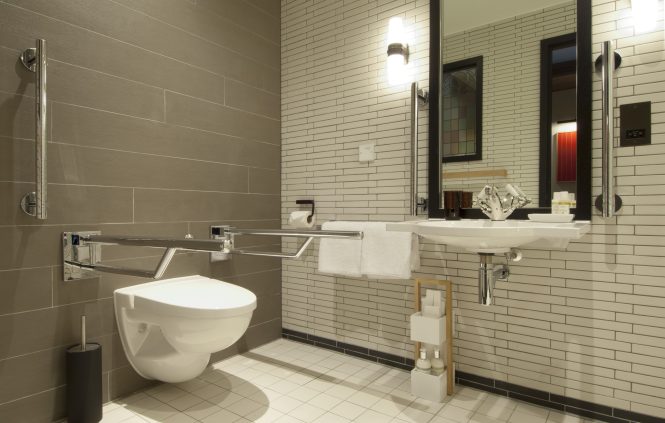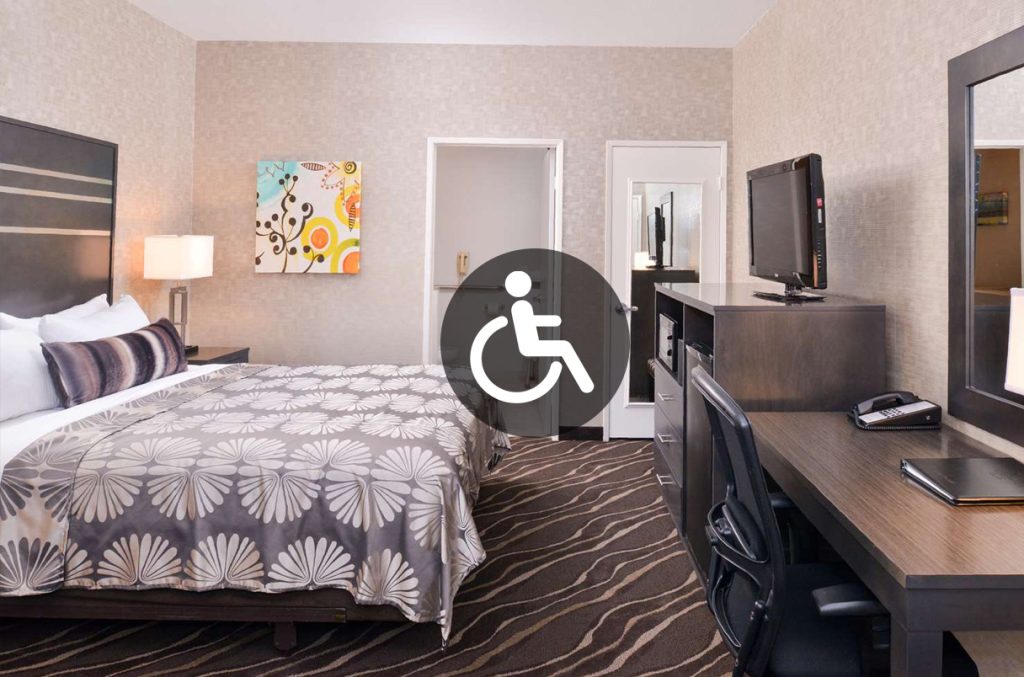

Do hotels have to be handicap accessible? The answer, in most cases, is a resounding yes. The concept of accessibility in hotels extends far beyond basic compliance; it’s about creating a truly inclusive experience for guests of all abilities. While some might view these regulations as extra burdens, the reality is that adapting to accessibility guidelines benefits both guests and the hotel itself. Many hotels prioritize accessibility as a way to increase their customer base and bolster their reputation as welcoming and community-oriented establishments. This article delves into the legal requirements, best practices, and the broader impacts of accessible accommodations. We’ll explore how accessibility is more than a legal obligation and a valuable investment. We’ll also look at potential challenges and solutions to achieving true accessibility.
Legal Requirements for Handicap Accessibility in Hotels
ADA Compliance: A Key Legal Mandate
The Americans with Disabilities Act (ADA) is a pivotal piece of legislation impacting the accessibility of hotels and numerous other public accommodations. The ADA mandates that accommodations make reasonable modifications to ensure accessibility for individuals with disabilities. Reasonable accommodations mean adapting facilities and services in ways that don’t impose undue financial and administrative burdens on the hotel. However, significant alterations are often required to ensure accessibility and comply with the ADA guidelines. Hotels must provide appropriate accommodations such as accessible entrances, restrooms, rooms, and common areas. Many public accommodations are subject to the ADA, though the standards and enforcement differ by location and circumstance. This includes hotels, restaurants, and transportation facilities. The ADA encourages equal opportunity and participation for people with disabilities within society.
Beyond ADA: International Standards and Local Regulations
While the ADA is a major influencing factor in hotel accessibility in the US, there are other international and regional accessibility guidelines and regulations. These guidelines often emphasize universal design principles, encompassing aspects like clear signage, accessible walkways, and strategically located assistive devices. These standards aim to eliminate barriers and ensure everyone can fully utilize hotel facilities and services. Local building codes and ordinances can also impose additional requirements for accessibility, so it’s essential to consult local authorities for comprehensive guidelines in particular circumstances. Different countries or regions may have distinct accessibility standards and regulations, making it essential for hotels to stay updated and compliant across various locations they operate in. In areas with limited regulations, accessibility is often guided by industry best practices and ethical considerations rather than strict mandates.
Accessibility Beyond Compliance: Best Practices and Benefits
Enhanced Guest Experience
Hotels that prioritize accessibility don’t just fulfill legal requirements; they enhance the guest experience for everyone. Creating an environment where individuals with disabilities feel welcome and can fully enjoy their stay positively influences the overall reputation and customer experience for the establishment. This broadens the customer base to include a more diverse group. This welcoming, inclusive environment often attracts families with children or those with temporary mobility impairments who have been inconvenienced by a lack of accessibility. These kinds of accommodations benefit the hotel’s reputation and increase its customer base. Hotels often use positive marketing strategies to emphasize accessibility features and their commitment to inclusivity.
Cost-Effective and Reputation Building
Surprisingly, the effort and investment in accessibility features are often cost-effective and beneficial in the long run. For example, installing ramps and accessible bathrooms, and strategically placing assistive devices can save the hotel money in the long run on lawsuits from guests. From a financial point of view, a hotel that is truly accessible and inclusive often stands out as more trustworthy and reliable from the perspective of its customers. Hotels that showcase a strong commitment to accessibility can often see increased profits in the long term. This is because accessibility is directly associated with reliability and trustworthiness, creating a positive brand image for the hotel.
Addressing Challenges in Implementing Accessibility
Budgetary Constraints and Resource Allocation
Hotels, especially those with older facilities, might face budgetary constraints when undertaking renovations and modifications to ensure full compliance with accessibility standards. Prioritizing essential elements and implementing phased approaches can help. Finding cost-effective solutions to address accessibility issues is necessary for smaller or budget-conscious hotels. Additionally, finding funding for accessibility renovations is vital, and there are often local and national grants available to help with such projects. Collaborating with local community organizations may also offer advice and support in finding appropriate resources and funding sources. Understanding the potential long-term benefits of accessibility will also help hotels justify necessary investments in renovations.
Managing Customer Expectations and Needs
Effective communication with guests with disabilities is vital. Hotels need to educate their staff on proper assistance and communication methods, which can improve the overall experience and prevent any possible misunderstandings or inconveniences. Creating a friendly and accommodating atmosphere can go a long way towards ensuring that guests with disabilities feel welcome and supported. Clear signage and easily accessible information can simplify the hotel experience.
The Importance of Ongoing Training and Compliance
Staff Education for Accessibility
Hotels must provide thorough training and education to their staff on disability awareness, communication techniques, and appropriate assistance methods. Training sessions can reinforce the hotel’s commitment to inclusivity and provide staff with the skills needed to address the needs of guests with disabilities. This leads to a more accommodating and efficient hotel environment. Clear communication and effective strategies for staff are essential for providing high-quality service.
Maintaining and Upgrading Accessibility Features
Accessibility features require ongoing maintenance to ensure proper functioning and safety. Regular inspections and evaluations to address potential deterioration or hazards are essential. Having a preventative maintenance schedule in place can minimize issues or problems that can arise with older or poorly maintained accommodations. This also prevents problems that could cause accidents or issues.
Case Studies and Examples of Successful Accessibility Implementation
Hilton Hotels
Hilton Hotels, as a large and well-known chain, have implemented various accessibility initiatives across their properties to comply with the ADA and meet international standards. These efforts showcase a commitment to making their facilities usable by guests with disabilities. They’ve created accessible rooms, pathways, and facilities, fostering inclusivity in their facilities and ensuring a higher standard of care for their guests. These accommodations are an example for hotels worldwide.
The Importance of Stakeholder Engagement
The inclusion and input of stakeholders such as accessibility advocates, disability organizations, and guests with disabilities are essential for ensuring successful and inclusive implementation. This can help improve their accommodations, facilities, and services. For example, the hotel might conduct surveys and ask for guest feedback to help address areas for improvement.
How to Find Accessible Hotels
Utilize Online Resources
Many online travel agencies and hotel booking platforms feature filters for accessible rooms. This makes finding an appropriate hotel or accommodation much easier. Use the filters and filters to find hotels, as well as reading reviews to confirm their accommodations.
Check Reviews and User Feedback
Checking reviews from other guests with disabilities can offer valuable insights into a hotel’s accessibility features. This often reflects the hotel’s actual performance when it comes to providing accessible accommodations.
Conclusion
In conclusion, the question of whether hotels have to be handicap accessible is generally answered with a resounding yes. ADA compliance and regional accessibility standards often require hotels to adjust and adapt in order to create an experience that is inclusive. This makes hotels better and more attractive places to stay. Hotels should prioritize accessibility not just for compliance but for the sake of good business and customer satisfaction. Accessibility is a necessary part of good business practice, and it can be cost-effective and beneficial in the long run. Remember to prioritize accessibility and inclusivity in your travel plans and choices.
The Importance of Ongoing Training and Compliance
Staff Education for Accessibility
Hotels must provide thorough training and education to their staff on disability awareness, communication techniques, and appropriate assistance methods. Training sessions can reinforce the hotel’s commitment to inclusivity and provide staff with the skills needed to address the needs of guests with disabilities. This leads to a more accommodating and efficient hotel environment. Clear communication and effective strategies for staff are essential for providing high-quality service.
Maintaining and Upgrading Accessibility Features
Accessibility features require ongoing maintenance to ensure proper functioning and safety. Regular inspections and evaluations to address potential deterioration or hazards are essential. Having a preventative maintenance schedule in place can minimize issues or problems that can arise with older or poorly maintained accommodations. This also prevents problems that could cause accidents or issues.
Frequently Asked Questions
What are the specific ADA requirements for accessible hotel rooms?
The ADA doesn’t prescribe a specific set of rules for accessible rooms; instead, it mandates reasonable accommodations. This means that hotels must modify their facilities to remove barriers and ensure access for people with disabilities without undue financial or administrative burdens. For example, this could mean providing grab bars in bathrooms, widening doorways, or installing ramps. The specific requirements for each hotel are individualized and should be assessed based on individual circumstances.
How can hotels effectively communicate accessibility features to potential guests?
Hotels can communicate accessibility features to guests in several ways. This includes highlighting accessibility features on their website, using clear and concise descriptions of the facilities, providing details on accessible amenities, and ensuring that brochures and advertisements provide information about accessible options. In addition, the hotel staff should be trained to provide accurate information about accessibility features during bookings and check-in.
In conclusion, accessibility in hotels is a crucial aspect of providing a welcoming and inclusive environment for all guests. Hotels must adhere to accessibility standards, not just for compliance but also for business success and a positive guest experience. Further research into specific accessibility regulations and best practices can be valuable for hotel owners and managers seeking to enhance their facilities and services. If you’re planning a trip, remember to verify a hotel’s accessibility features before booking to ensure a comfortable and enjoyable stay for everyone in your party. Visit our website for more detailed information on accessible accommodations and guidelines.